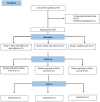The effect of music and white noise on patients' anxiety and pain during surgery for impacted mandibular third molar: a single-blind randomized controlled trial
- PMID: 40551282
- PMCID: PMC12183815
- DOI: 10.1186/s40001-025-02767-1
The effect of music and white noise on patients' anxiety and pain during surgery for impacted mandibular third molar: a single-blind randomized controlled trial
Abstract
Background: Anxiety during oral surgery adversely affects patients' compliance with treatment and patient-doctor cooperation. Therefore, various treatment protocols have been developed to reduce anxiety. This study aimed to evaluate the effects of music and white noise on patients' anxiety and pain during surgery for impacted third molars.
Methods: According to the Consolidated Standards of Reporting Trials statement, this single-blind, randomized, controlled trial with parallel groups involved 66 patients who met the eligibility criteria and were randomly assigned to one of three groups. Group 1 listened to preselected songs played against a pre-prepared standard "white noise" through noise-isolating headphones that block ambient noise during the procedure. Group 2 listened only to music through noise-isolating headphones during the procedure. Group 3 listened to natural ambient noise during the procedure. All surgical procedures were performed in a standard operating room. All patients completed the State-Trait Anxiety Inventory-State (STAI-S) form and indicated their anxiety on a Visual Analog Scale (VAS) preoperatively and postoperatively. They also indicated the pressure/pain level they felt during the procedure on a VAS. The primary predictor variable was the music and white noise intervention. The primary outcome variables were the STAI-S and VAS scores. Sex was included as a covariate.
Results: Anxiety VAS scores were significantly lower postoperatively than preoperatively in Groups 1 (p < 0.001), 2 (p < 0.001), and 3 (p = 0.002). Similarly, STAI-S scores were significantly lower postoperatively than preoperatively in Groups 1 (p < 0.001), 2 (p < 0.001), and 3 (p = 0.012). The change in STAI-S scores (p = 0.053) did not differ significantly between groups.
Conclusion: Although not statistically significant, listening to music alone or with white noise reduced the anxiety experienced by patients during the procedure and increased their comfort. As a simple, inexpensive, and non-invasive method, listening to self-selected music in the preoperative and perioperative periods could benefit patients.
Keywords: Anxiety; Tooth extraction; White noise.
© 2025. The Author(s).
Conflict of interest statement
Declarations. Ethics approval and consent to participate: This study received ethical approval from the Ethics Committee of Ankara University (decision number: 09/01-18) and was performed according to the Declaration of Helsinki. All subjects provided written informed consent during study enrollment. Consent for publication: Not applicable. Competing interests: The authors declare no competing interests.
Similar articles
-
Music interventions for improving psychological and physical outcomes in cancer patients.Cochrane Database Syst Rev. 2016 Aug 15;(8):CD006911. doi: 10.1002/14651858.CD006911.pub3. Cochrane Database Syst Rev. 2016. Update in: Cochrane Database Syst Rev. 2021 Oct 12;10:CD006911. doi: 10.1002/14651858.CD006911.pub4. PMID: 27524661 Updated.
-
Should Preoperative Information Before Impacted Third Molar Extraction Be Visual, Verbal, or Both?J Oral Maxillofac Surg. 2023 May;81(5):632-640. doi: 10.1016/j.joms.2023.01.005. Epub 2023 Feb 9. J Oral Maxillofac Surg. 2023. PMID: 36774965 Clinical Trial.
-
The Effect of Music on Fear and Anxiety of Children During Tomography: A Randomized Controlled Double-Blind Study.Int J Nurs Pract. 2025 Jun;31(3):e70029. doi: 10.1111/ijn.70029. Int J Nurs Pract. 2025. PMID: 40511812 Clinical Trial.
-
Interventions for reducing anxiety in women undergoing colposcopy.Cochrane Database Syst Rev. 2011 Dec 7;2011(12):CD006013. doi: 10.1002/14651858.CD006013.pub3. Cochrane Database Syst Rev. 2011. PMID: 22161395 Free PMC article.
-
Music interventions for improving psychological and physical outcomes in cancer patients.Cochrane Database Syst Rev. 2011 Aug 10;(8):CD006911. doi: 10.1002/14651858.CD006911.pub2. Cochrane Database Syst Rev. 2011. Update in: Cochrane Database Syst Rev. 2016 Aug 15;(8):CD006911. doi: 10.1002/14651858.CD006911.pub3. PMID: 21833957 Updated.
References
-
- Yusa H, Onizawa K, Hori M, Takeda S, Takeda H, Fukushima S, et al. Anxiety measurements in university students undergoing third molar extraction. Oral Surg Oral Med Oral Pathol Oral Radiol Endodontol. 2004;98(1):23–7. - PubMed
-
- Kazancioglu HO, Tek M, Ezirganli S, Demirtas N. Does watching a video on third molar surgery increase patients’ anxiety level? Oral Surg Oral Med Oral Pathol Oral Radiol. 2015;119(3):272–7. - PubMed
-
- Muglali M, Komerik N. Factors related to patients’ anxiety before and after oral surgery. J Oral Maxillofac Surg. 2008;66(5):870–7. - PubMed
-
- De Jongh A, Adair P, Meijerink-Anderson M. Clinical management of dental anxiety: what works for whom? Int Dent J. 2005;55(2):73–80. - PubMed
-
- Malamed SF. Is the mandibular nerve block passé? J Am Dent Assoc. 2011;142:3S-7S. - PubMed
Publication types
MeSH terms
LinkOut - more resources
Full Text Sources
Medical
Research Materials
Miscellaneous


